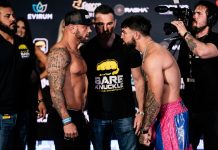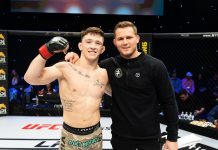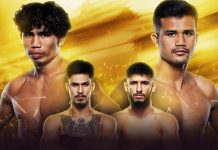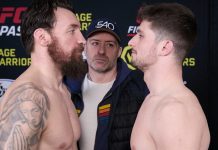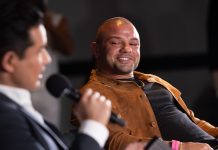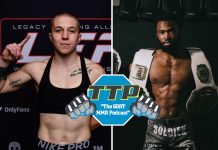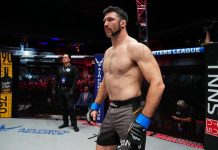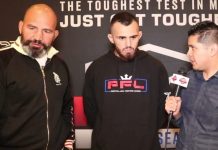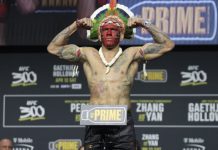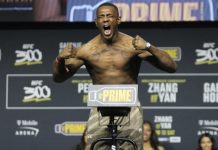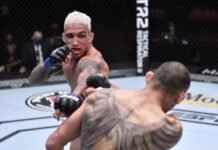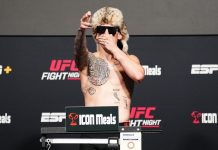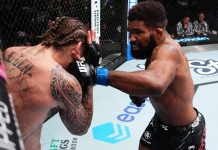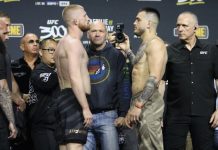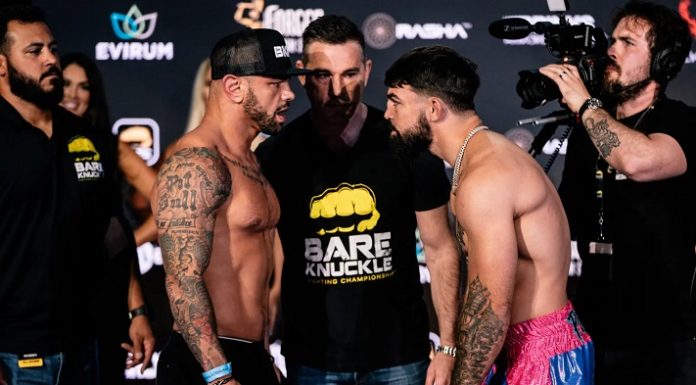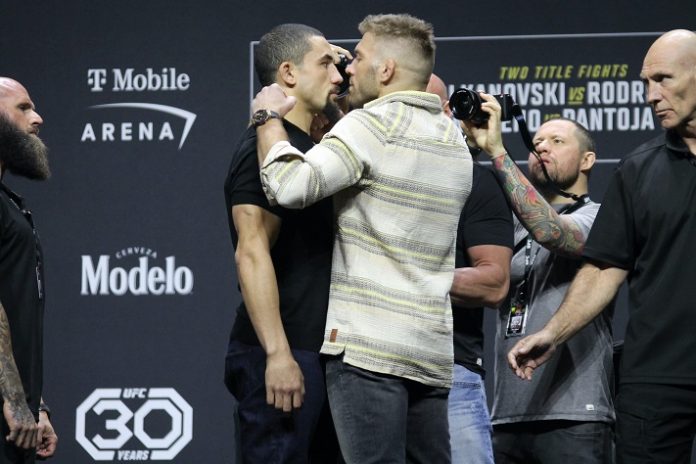
There are no happy endings in MMA, or so the saying goes. The sport feeds its old to the young; aged warriors all to often shuffle out, nagged by injury and slowed by too many exhausting, damaging wars for one last chance at glory— only to be feasted on by the next up-and-comer.
The idea of retirement fights against a fighter equal in skill, experience, and age has all but been dismissed in the modern UFC, and at UFC 290, it felt as if we might be in for another rough night. Robbie Lawler, gladiator of modern gladiators, was set to make the walk for the last time, at 41 matched up with a far younger Niko Price.
We’d seen this story before. Anderson Silva. Cowboy Cerrone. Frankie Edgar. But for once, the old rule was broken: “Ruthless” Robbie Lawler turned back the clock, admittedly on the only night of his entire fight camp on which his body actually felt good, and put away Price early. With the fastest knockout of his UFC career, in fact.
Ruthless has called it a career!
Congratulations on an unforgettable run, @Ruthless_RL 🙌 pic.twitter.com/T8Tem3kgp7
— UFC (@ufc) July 9, 2023
UFC 290 had already been a very good card to that point, and the Pay-Per-View portion of the show had yet to kick off. Despite taking a few hits in advance of the event (the loss of Sean Brady, then Jack Della Maddalena, among others), despite many of the UFC’s biggest stars being unavailable for the annual spectacle, the fights themselves delivered, one after the other.
Finish after finish.
What was to come was even better. A near-flawless night, overall, with the main card easily living up to what came before. Bo Nickal, middleweight wunderkind, reminded everyone why he’s the most hyped prospect in years. Nickal was to have faced TUF 29 alum Tresean Gore, but got a short-notice fill in instead, with Florida’s Val Woodburn stepping in. Woodburn didn’t last long, and Nickal won a fight he was very much expected to win.
But despite being one of the biggest favorites in UFC history, it’s how Nickal won that has surprised many. He got it done with his hands, battering Woodburn on the feet with pinpoint accuracy for the first-round finish. If you’d watched Nickal’s coming out party in Jorge Masvidal’s iKon FC, you knew the young man could throw. But for those whose MMA knowledge begins at U and ends with C, the revelation that Nickal can do more than wrestle has them hyped up more than ever before. Either way, Nickal doing that on a big stage is key for his career, and he could soon be on the fast track at 185lbs.
Dan Hooker and Jalin Turner putting on a war in the very next fight kept things at a fever pitch, and that right there, ladies and gents, would have been your fight of the night, had Brandon Moreno vs. Alexandre Pantoja not happened just a little bit later. The co-main event was every bit of the war Hooker vs. Turner was; like Hooker, Moreno came away with a broken limb, but unlike Hooker, he did not come away with the win — or with his title intact. Instead, Alexandre Pantoja won a split decision to claim flyweight gold, giving Brazil a title once again after Amanda Nunes’ retirement a month back had left them without a UFC champ for the first time in ages.
Alexander Volkanovski reminded us all in the main event why he is the best featherweight on the planet, and whether it’s Ilia Topuria next, or another shot at lightweight and Islam Makachev, it might be time to stand up and take notice of just what this man is doing. Volkanovski, as dominant as he has been, continues to show a humility and willingness to learn that will serve him well in the coming years.
Case in point, criticism of him acknowledging a Rodriguez strike in the fight wasn’t met with denial or scorn. Rather, Volkanovski told media members that it would be something for him to work on. “Maybe I’ve got to work on it, because at the end of the day, all that matters is what everyone else thinks, and what them judges think. If that is something that’s going to stick in their head— we talk about being smart, fighting smart, having IQ, I need to work on that. Maybe I need to do something about that.”
Volkanovski is quickly becoming Australia’s GSP, and while the country has other stars — former middleweight champ Robert Whittaker among them — it’s the former Rugby player who, with five title defenses already at 145lbs, seems to have the chance to really push for records in the next few years.
Any talk of a near-flawless night, however, means there were flaws, one glaring one in particular. Dricus Du Plessis was flawless in taking apart the aforementioned Whittaker, earning the South African a middleweight title shot. What transpired after, however, is indicative of just how dark the build-up to that title fight could become.
Entering the cage for a rare post-fight face-off, champ Israel Adesanya proceeded to drop N-bomb after N-bomb, lobbing them at Du Plessis, a white South African who previously claimed to be “the African fighter” in the UFC because he lives and trains in the country, unlike Nigerian Adesanya, who calls New Zealand home.
That line by Du Plessis, told to Cageside Press in a media scrum ahead of UFC 285, has often been misquoted as Du Plessis saying he was the “real African” of the two. He’s also backed off the angle since, but it’s clear the jibe, whether you see it as racially tinged or otherwise, got under Adesanya’s skin. What transpired Saturday makes the UFC’s usual staunch stance against such manufactured confrontations seem wise; the regrettable exchange included Du Plessis claiming “I’m African, but I’m no brother of yours” after Adesanya called him “my African brother,” and Izzy suggesting Du Plessis take a “36 and me” DNA test to find out where he’s really from. That was later switched to “26 and me,” which really makes you wonder how many chromosomes Adesanya thinks he has (46, 23 pairs, hence “23 and Me” being the company’s actual name).
There’s no question Du Plessis brought this on himself. Making a big deal about where one trains is particularly pointless in the modern UFC: Michael Bisping trained in the U.S., Khamzat Chimaev trains in Sweden, Gilbert Burns trains in Florida. Fighters move around all the time; many choose to stay in their adopted homes. But no matter how dismissive Dana White wants to be of the “racial undertones,” this power keg has the potential to explode at the wrong time. Race relations are arguably at their lowest in years in the U.S.; South Africa, meanwhile, is just 30 years removed from apartheid.
In answer to a question by The Underground’s John Morgan on Saturday, White was quick to downplay the issue, taking his usual approach of turning it around on those voicing concerns. “I could care less. This is the fight business. Israel Adesanya can say whatever he wants to say. Are people bitching about it? Of course they are. Too f*cking bad.” But leaving politics at the door has always been something the UFC has striven for, Donald Trump cameos not withstanding. This might be a good time to stick with that, dust off the old UFC code of conduct, and get the fighters involved on board. Otherwise, the one blemish on an otherwise flawless night runs the risk of marring what should be a very, very good fight.

